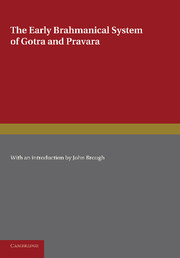 The Early Brahmanical System of Gotra and Pravara
The Early Brahmanical System of Gotra and Pravara Book contents
- Frontmatter
- Contents
- Abbreviations
- Sigla
- Preface
- INTRODUCTION
- GOTRA-PRAVARA-MANJARī OF PURUŞOTTAMA-PAŅḌITA
- INTRODUCTION AND SUMMARY OF CONTENTS
- CHAPTER I General Rules
- CHAPTER II The Bhṛgus
- CHAPTER III The Angirases
- CHAPTER IV The Atris
- CHAPTER V The Viśvāmitras
- CHAPTER VI The Kaśyapas
- CHAPTER VII The VasiŞṭhas
- CHAPTER VIII The Agastis
- CHAPTER IX Kśatriyas and Vaiśyas
- CHAPTER X Ignorance as to pravara, etc
- CHAPTER XI The Mānava-pravara
- CHAPTER XII Conclusion
- Index
INTRODUCTION AND SUMMARY OF CONTENTS
from GOTRA-PRAVARA-MANJARī OF PURUŞOTTAMA-PAŅḌITA
Published online by Cambridge University Press: 05 June 2016
- Frontmatter
- Contents
- Abbreviations
- Sigla
- Preface
- INTRODUCTION
- GOTRA-PRAVARA-MANJARī OF PURUŞOTTAMA-PAŅḌITA
- INTRODUCTION AND SUMMARY OF CONTENTS
- CHAPTER I General Rules
- CHAPTER II The Bhṛgus
- CHAPTER III The Angirases
- CHAPTER IV The Atris
- CHAPTER V The Viśvāmitras
- CHAPTER VI The Kaśyapas
- CHAPTER VII The VasiŞṭhas
- CHAPTER VIII The Agastis
- CHAPTER IX Kśatriyas and Vaiśyas
- CHAPTER X Ignorance as to pravara, etc
- CHAPTER XI The Mānava-pravara
- CHAPTER XII Conclusion
- Index
Summary
He who marries the daughter of a man of his own gotra or pravara is to be subjected to the same punishments and penances, etc., as one who sins with his mother; and he begets on her a son who is a Caṇḍāla by caste.
But if a man in ignorance marries such a girl and has intercourse with her, the wife ought to undergo a Lunar penance, and if she conceives, the offspring is not denied, and is said by the sages who are expert in gotra matters to belong to the KāŚyapa gotra.
When the man has performed the Cāndrāyaṇa penance, and has expelled his sin, then husband and wife should together serve one another all the days of their life, showing mutual respect, like mother and son.
Those who do not know the gaṇas of their own gotra- and pravara-seers and those of others, must be held to fall into great sin, but those who know this distinction dwell in the world of Brahmā.
And since it is difficult to grasp the gotras, which number three koṭis, I have therefore undertaken this ‘Cluster of buds’ (mañjarī) which has as its fruit the understanding of all the gotras and pravaras of everyone. May this ‘Cluster’, blossoming with gotras and having understanding of the pravaras as its fruit, be an oblation of flowers among the lotus petals which are the feet of the wise men who know all things and are learned in the Vedas.
In this work, therefore, by the favour of Śiva and of my teacher, I shall explain the pravaras of the three varṇas to the best of my instruction and knowledge, for the sake of aiding those who are lacking in learning or wisdom.
- Type
- Chapter
- Information
- The Early Brahmanical System of Gotra and PravaraA Translation of the Gotra-Pravara-Manjari of Purusottama-Pandita, pp. 55 - 59Publisher: Cambridge University PressPrint publication year: 2013


